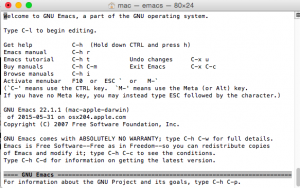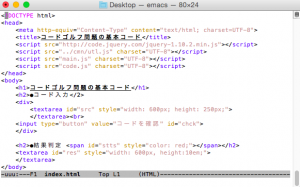トークンごとに、その属性を表示します。文字種表も使います。識別子には英数字、下線を利用、先頭は英字が下線です。エスケープ文字や漢字、コメント機能もないものとします。
/*--------------------*/
/* 字句解析 token_p.cpp */
/*--------------------*/
#include <iostream>
#include <fstream>
#include <iomanip>
#include <string>
#include <cstdlib>
#include <cctype>
using namespace std;
enum TknKind {
Lparen=1, Rparen, Plus, Minus, Multi, Divi,
Assign, Comma, DblQ,
Equal, NotEq, Less, LessEq, Great, GreatEq,
If, Else, End, Print, Ident, IntNum,
String, Letter, Digit, EofTkn, Others, END_list
};
struct Token {
TknKind kind;
string text;
int intVal;
Token() { kind = Others; text = ""; intVal = 0; }
Token(TknKind k, const string& s, int d=0){
kind = k; text = s; intVal = d;
}
};
void initChTyp();
Token nextTkn();
int nextCh();
bool is_ope2(int c1, int c2);
TknKind get_kind(const string& s);
TknKind ctyp[256];
Token token;
ifstream fin;
struct KeyWord {
const char *keyName;
TknKind keyKind;
};
KeyWord KeyWdTbl[] = {
{"if", If }, {"else", Else },
{"end", End},{"print", Print },
{"(", Lparen}, {")", Rparen},
{"+", Plus }, {"-", Minus },
{"*", Multi },{"/", Divi },
{"=", Assign}, {",", Comma },
{"==", Equal }, {"!=", NotEq },
{"<", Less }, {"<=", LessEq },
{"", END_list},
};
int main(int argc, char *argv[])
{
if (argc == 1) exit(1);
fin.open(argv[1]); if (!fin) exit(1);
cout << "text kind intVal\n";
initChTyp();
for (token = nextTkn(); token.kind != EofTkn; token = nextTkn()){
cout << left << setw(10) << token.text
<< right << setw(3) << token.kind
<< " " << token.intVal << endl;
}
return 0;
}
void initChTyp()
{
int i;
for(i=0; i<256; i++) { ctyp[i] = Others; }
for(i='0'; i<='9'; i++){ ctyp[i] = Digit; }
for(i='A'; i<='Z'; i++){ ctyp[i]=Letter; }
for(i='a'; i<='z'; i++){ ctyp[i]=Letter; }
ctyp['(']= Lparen; ctyp[')'] = Rparen;
ctyp['<']=Less; ctyp['>'] = Great;
ctyp['+']= Plus; ctyp['-'] = Minus;
ctyp['*']= Multi; ctyp['/'] = Divi;
ctyp['_']= Letter; ctyp['=']= Assign;
ctyp[',']= Comma; ctyp['"']= DblQ;
}
Token nextTkn()
{
TknKind kd;
int ch0, num = 0;
static int ch = ' ';
string txt = "";
while (isspace(ch)){ ch = nextCh();}
if (ch == EOF) return Token(EofTkn, txt);
switch (ctyp[ch]){
case Letter:
for ( ; ctyp[ch]==Letter || ctyp[ch]==Digit; ch=nextCh()){
txt += ch;
}
break;
case Digit:
for (num=0; ctyp[ch]==Digit; ch=nextCh()){
num = num*10 +(ch-'0');
}
return Token(IntNum, txt, num);
case DblQ:
for (ch=nextCh(); ch!=EOF && ch!='\n' && ch!='"'; ch=nextCh()){
txt += ch;
}
if (ch != '"'){ cout << "文字列リテラルが閉じていない\n"; exit(1);}
ch = nextCh();
return Token(String, txt);
default:
txt += ch; ch0 = ch; ch = nextCh();
if (is_ope2(ch0, ch)){ txt += ch; ch = nextCh();}
}
kd = get_kind(txt);
if (kd == Others){
cout << "不正なトークンです:" << txt << endl; exit(1);
}
return Token(kd, txt);
}
int nextCh()
{
static int c = 0;
if (c == EOF) return c;
if ((c = fin.get())== EOF) fin.close();
return c;
}
bool is_ope2(int c1, int c2)
{
char s[] = " ";
if (c1=='\0' || c2 == '\0') return false;
s[1] = c1; s[2]= c2;
return strstr(" <= >= == != ", s) != NULL;
}
TknKind get_kind(const string& s)
{
for (int i =0; KeyWdTbl[i].keyKind != END_list; i++){
if (s == KeyWdTbl[i].keyName) return KeyWdTbl[i].keyKind;
}
if (ctyp[s[0]] == Letter ) return Ident;
if (ctyp[s[0]] == Digit) return IntNum;
return Others;
}





